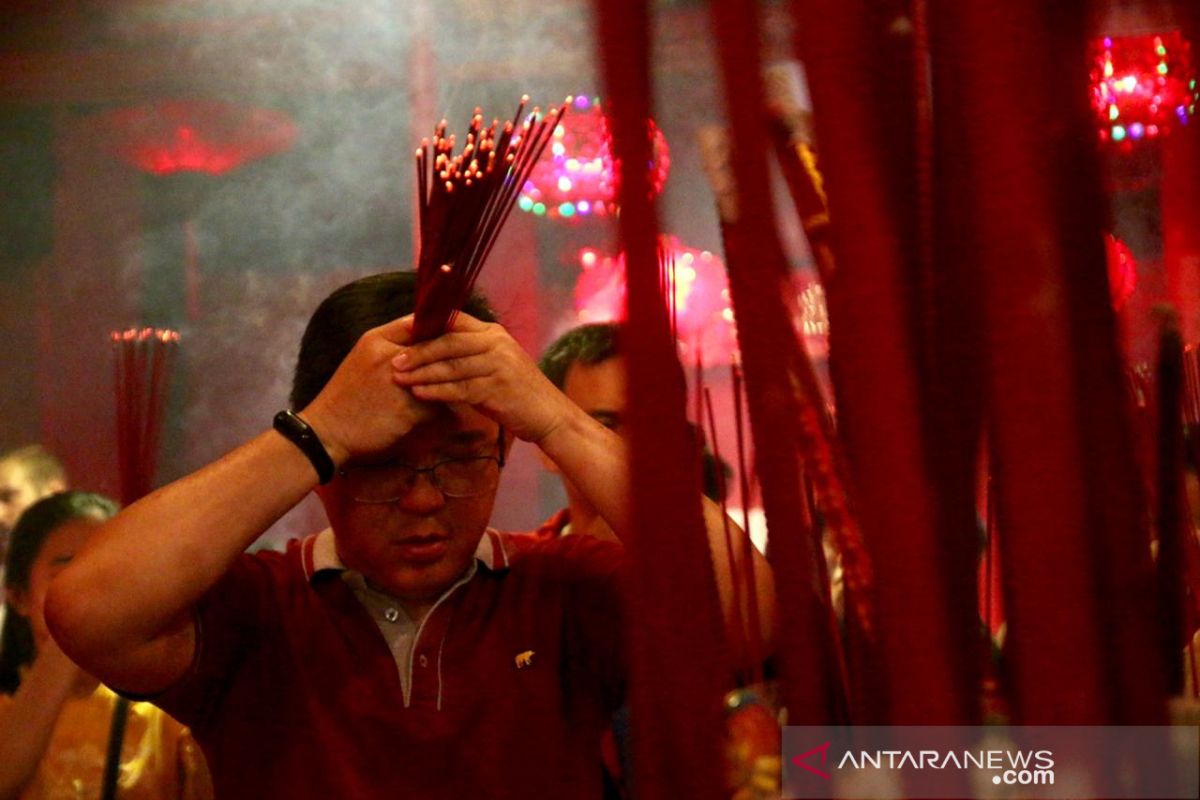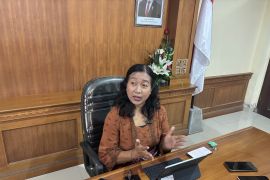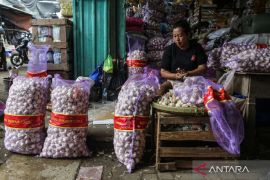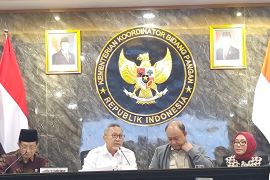A man, who stood before the crowds, chanted prayers, with his words being followed by the masses. During the service, white smoke, billowing from the burning incenses, filled the prayer area before vanishing into the air.
In the wee hours of the first day of Year 2571 Lunar Calendar, most Chinese descendants at the temple prayed for a prosperous life since they believe the Gods and other deities will descend from Heaven onto Earth to bless the people.
"We pray first to the God of the Sky, as he is the leader of other deities, and we must welcome his presence on Earth by praying and serving proper offerings," Johny, one of the Tridharma disciples, remarked while citing that the Gods favored all sweet delicacies, such as the Chinese New Year's cake, which is a sticky cake made of sugar palm and glutinous rice; oranges; apples; and dodol, an Indonesian sugar palm-based confection made of glutinous rice.
Since his childhood years, Johny, presently in his 60s, has offered prayers at the temple on Lunar New Year's eve. "I was born here at Petak Sembilan, Glodok (one of Jakarta's Chinatowns in West Jakarta). My late parents also prayed here. Despite presently residing in Senen (Central Jakarta), I will return to this place every Lunar New Year to respect the family tradition," Johny expounded before heading to the Kwan-Im shrine for an hour-long meditation.
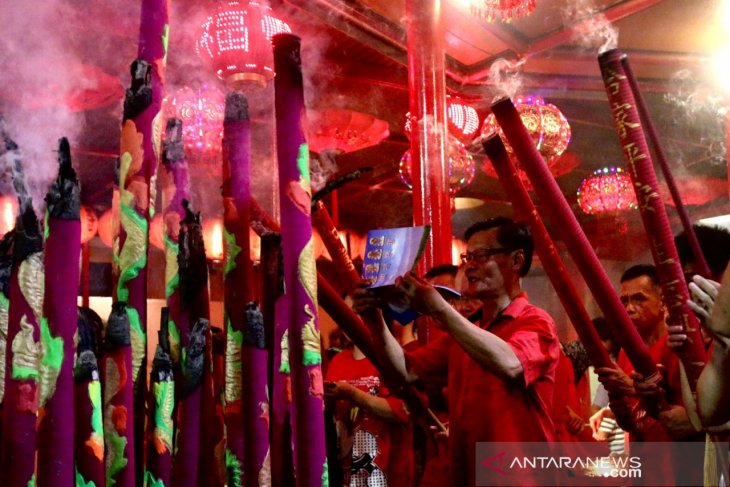
At least 25 statues of deities of Buddhism, Confucianism, and Taoism have been on display at the temple for decades. However, the oldest one is a centuries-old Kwan-Im statue that has been preserved in a fully air-conditioned room near the temple's main premises, the Dharma Bakti's caretaker, Lucas Tjang, stated.
"Everyone is welcome to pray at the Kwan-Im shrine, but please do not make loud noises, as it will disturb the pilgrims," Tjang added while prompting tourists to not take pictures and bring a professional camera within the premises.
He noted that rituals and prayers for Lunar New Year in 2020 remain same as the previous years. However, a praying guidance for the Lunar New Year that currently coincides with the Year of Rat, a Chinese zodiac sign, will notify pilgrims on which deity should be worshipped first to avoid unfortunate events during the year.
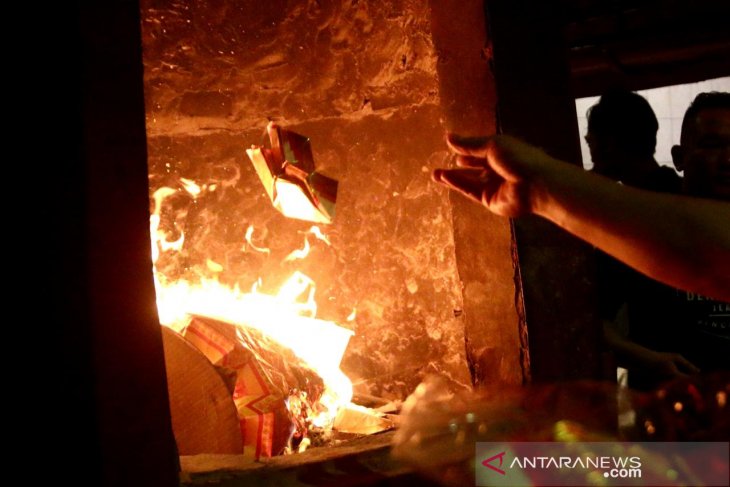
"People born in the Year of Rabbit, in the age of 10, 22, 34, 46, 58, 70, 82, and 94, as well as people born in January, February, March, May, July, August, and September, must pray first to the Fu Te Chen Shen deity for protection and blessing," the praying guidance told.
According to Tao belief, Fu Te Chen Shen (read: Fu-de zheng shen), also popular as Hok-tek tjeng sin, is the God of Earth and Prosperity. The deity was portrayed in a statue of an old wise man, with long white beard and gold in his hands.
The deity was once respected by most Chinese descendants in Batavia, Jakarta's previous name under the Dutch East Indies occupation, since in the mid-17th Century, most of China's community in the city worked as farmers and traders, Adolf J. Heuken, a prolific writer on Jakarta's history and heritage, noted in his book titled “Tempat-Tempat Bersejarah di Jakarta” (Historical Places in Jakarta).
Temple of golden virtues
Since being built in the 1650s, the Dharma Bakti temple, or Jin De Yuan temple, has been a sacred home for most Chinese descendants, who follow Tridharma, a belief that combines the teachings of the Buddha, Confucius, and Lao-tsu or Taoism.
According to the "Chinese Chronicle in Batavia", as told by Heuken in his book, the temple was first built in the 1650s by China's lieutenant, Guo Xun-guan, as a homage to the Buddhist deity, Guan-yin, or popular as Kwan-Im. In 1755, an unidentified Chinese captain refurbished the temple and renamed it, from Kwan-Im temple to Jin-de Yuan temple, or the temple of Golden Virtues.
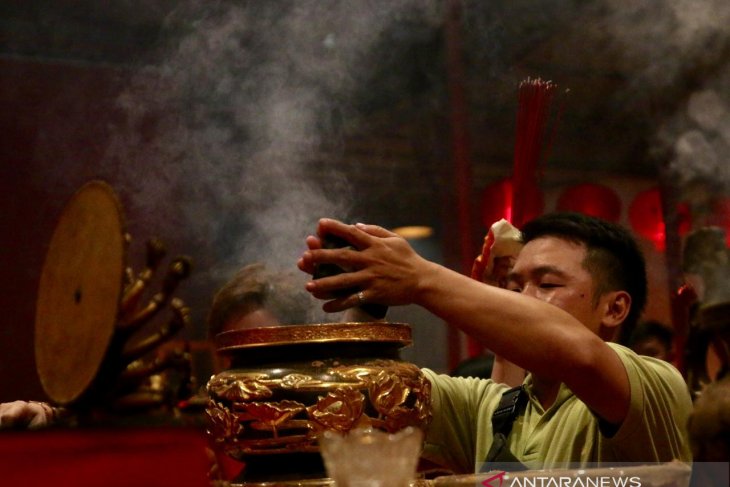
In mid-1740, most Chinese heritages and buildings, including the temple, were destroyed by the Dutch East Indies military, an incident that was later known as the Chinese massacre in Batavia.
Decades after the massacre, the temple was refurbished twice, in 1846 and 1890. Another renovation project was launched in 2016 after the temple was under fire on March 2015. Despite some premises yet under construction, the temple of Golden Virtues has kept its doors open for nearly 24 hours to welcome pilgrims and tourists during Lunar New Year and 15 days thereafter.
Related news: Jakarta caps Lunar NY with lion dances, festivities
Related news: Jakarta Governor Baswedan visits Dharma Bhakti temple
Related news: Confucianism Council calls for modesty during Lunar New Year
Editor: Atman Ahdiat
Copyright © ANTARA 2020
